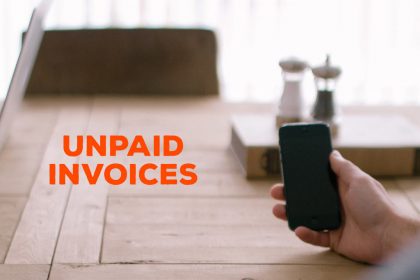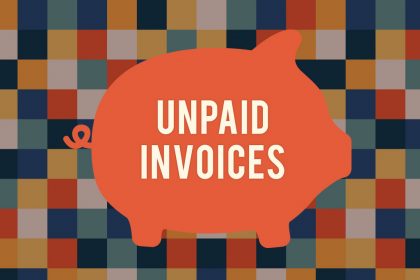10 business cash flow mistakes you need to avoid
How good are you at managing your business or freelance finances? Find out if you’re making one of the 10 most common cash flow mistakes – and how you can avoid them.
Every business (and freelancer) needs a healthy cash flow. You need to make sure you’re invoicing regularly, and that your clients or customers are paying their bills on time, so you have enough money to pay your bills.
Clare Hughes is Operations Manager and Co-Founder of Cashflow Protector – a technology-driven, low cost, credit control solution for sole traders, micro-businesses and SMEs. She shares the 10 most common mistakes she sees business and freelancers make with their cash flow, and explains how you can avoid them.
Why you need a healthy cash flow
There are a number of very good reasons why you need to ensure your cash flow is well-managed. Without good systems in place, you risk facing a number of uncomfortable financial problems:
- You don’t have enough money to pay yourself a salary.
- You don’t have enough money to pay your staff their salaries.
- You can’t afford to buy the supplies you need to run your business.
- You can’t afford to pay your business or personal tax bills.
- You incur bank charges from being overdrawn.
- You get a reputation yourself as a poor payer.
- You affect your own credit rating.
- Unscrupulous debtors avoid paying you on time (or at all).
- Debtors go out of business before paying you.
10 business cash flow mistakes you need to avoid
So how do you avoid these unpleasant scenarios? It’s easy – by making sure you don’t make the most common mistakes made by small businesses and freelancers, and instead install foolproof systems to stay on top of your finances.
And to help you do so, we’ve identified the 10 business cash flow mistakes you really need to avoid – and share our advice to help you do so.
1) Having outdated (or no) terms and conditions
Have you provided your clients with terms and conditions? And is so, are they up-to-date, and do they clearly state your payments terms and any interest you can apply for late payment?
If not, make sure you email all your clients a copy of them, explaining that this latest version is the one you will be applying.
2) Not providing your terms and conditions when you quote
Are your terms and conditions clearly stated on your quotes or accompanying them? Your clients need to be aware of your terms and conditions when they accept your quote or you accept their order – it’s too late to just print them on the back of your invoice and hope they’ll adhere to them.
So make sure they are provided with a copy with every quote or tender (ideally they’ll be printed on the reverse), and that you clearly state that the quotation is subject to your terms and conditions.
3) Not knowing who is responsible for payment
In many companies, the person who places an order with you isn’t the person who will be processing and paying your invoice.
So find out the name and contact details of the person who is, and use them as a point of contact when discussing or chasing payment.
4) Not confirming payment agreements by email
If you need to contact a customer or client about payment, note what is said and be specific about agreeing future actions.
If appropriate, confirm these by email so you all have a record of what was agreed (it also gives them opportunity to clarify any points if you misunderstand).
5) Not checking up on payment promises
If a customer or client promises to pay your invoice by a certain day, make a note of that day in your diary and check whether it has arrived.
If not, call your payment contact to chase further. (Or you can contact them to thank them for payment if it does arrive.)
6) Not being relentless
If you’re unlucky enough to have a tricky payer, you need to keep on their tail. If not, they’ll happily sit in your money and hold off paying you for as long as you’ll let them.
7) Being too lenient
By the same token, if you’re seen as a lenient supplier, some customers and clients will take full advantage. They’ll assume that you don’t mind waiting for your money and are prepared to extend their credit.
Any funds they do have to pay their bills will instead go to creditors who have clear and firm payment terms, and enforce them rigidly.
So make sure you stick to your own terms and conditions, and enforce them with your clients and customers – regularly chasing any late payments as soon as they are overdue.
8) Factoring your cash flow
If your cash flow is really tight, you can ‘sell’ your invoices or accounts due to specialised companies – this is called factoring.
After checking the credit-worthiness of the businesses or people who owe you, factoring companies will usually pay you between 70-90% of your invoice value. They’ll then chase your invoices themselves, and pay you the balance (less a transaction fee) once they receive it.
The advantage of using this system is that you’ll get paid quicker (you’ll usually receive payment around 24-48 hours after handing over your invoices). The big, and obvious, disadvantage though is that you’ll receive less money.
If you can set up clear systems for managing your cash flow – and be persistent in following them – you’ll be able to manage your finances smoothly, without the need to resort to expensive factoring.
9) Not being realistic about how much credit control costs you
Just like any aspect of running your business, you need to be clear about how much time chasing payments is taking you – and how much that time is worth in loss of time elsewhere.
For many freelancers and small business owners, the time they spend chasing payments would be much better used actually doing more of the activities that earn them money. So be realistic about how much your time is worth, and make sure you can afford to chase your creditors yourself.
10) Not outsourcing
If you really, really hate chasing money, you’re not good at it, or you recognise that your time is more profitably spent running other parts of your business, you may want to consider outsourcing your credit control to specialists who will retain your customer goodwill – and get you paid.
Stop making these mistakes and get paid today!
If you’re making any of these 10 mistakes, try to find a way to rectify it today – and you’ll enjoy a healthier cash flow with clients who are clear on your payment terms.
And if you do need help to establish better systems for your business or freelance work, make sure you get it. It will pay off in the long run.
Clare Hughes is Operations Manager and Co-Founder of Cashflow Protector – a technology-driven, low cost, credit control solution for sole traders, micro-businesses and SMEs.










